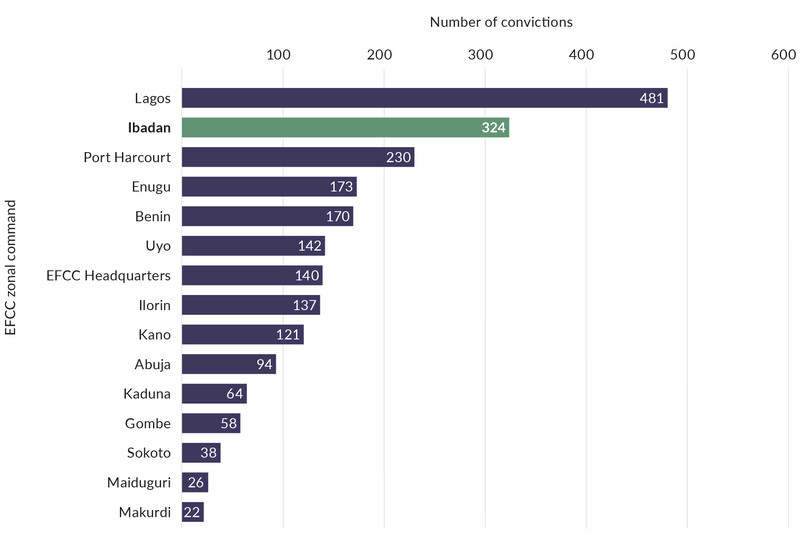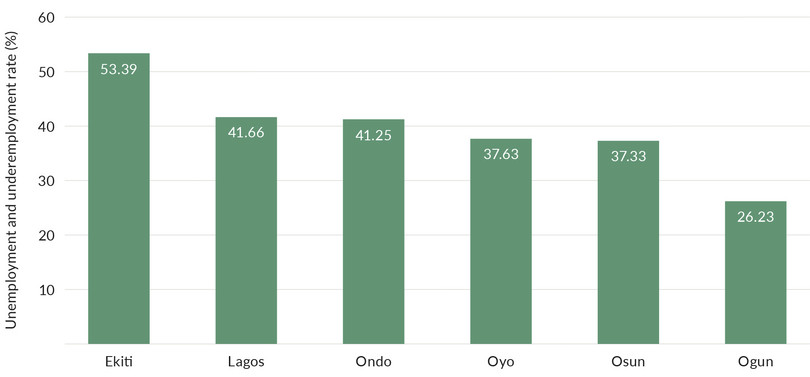A surge in cybercrime in Oyo State, Nigeria, has triggered a spike in arrests and the involvement of anti-crime group Amotekun, but alternative responses are needed.
In February 2022, the Chairman of Nigeria’s Council of Amotekun Commanders in the South West, the state-created regional anti-crime outfit, announced the group’s focus on tackling cybercriminals, popularly known as ‘Yahoo Boys’. The commander linked Yahoo Boys to a spate of ‘ritual killings’, labelled by the press as an ‘emerging insecurity menace in the South West’.1
Amotekun’s increased focus on Yahoo Boys appears to fall outside of the group’s central mandate of fighting violent crimes (such as kidnapping), particularly in rural areas.2 This may be linked to emphasis by domestic press on the connections between so-called Yahoo Plus, the allegedly more violent iteration of Yahoo Boys that emerged in 2020, and ritual violence in the south-west. Yet incorporating poorly regulated vigilantes into responding to illicit markets with tenuous links to violence and instability may be counter-productive, escalating rather than mitigating the consequences of these criminal economies.

Figure 11 Nigerian Economic and Financial Crimes Commission convictions, 2021.
NOTE: The Economic and Financial Crimes Commission (EFCC) is a Nigerian law enforcement agency that investigates financial crimes. Although the 2021 data does not include a breakdown of convictions by crime type, the vast majority of the EFCC’s past convictions have been cyber-related.
Economic and Financial Crimes Commission, via https://www.premiumtimesng.com/news/top-news/504409-efcc-se-cured-2220-convictions-in-2021-spokesperson.html.
The Amotekun commander lamented the ‘upsurge in the involvement of young people in fraudulent activities’,3 an increase confirmed by law-enforcement officials interviewed by the GI-TOC in Oyo State. According to the Zonal Head of Nigeria’s antigraft agency, the Economic and Financial Crimes Commission (EFCC), Oyo State has the highest rate of cybercrime in the south-west region.4
The surge in cybercriminal activity is claiming a growing proportion of law-enforcement resources in Nigeria; of the 978 convictions recorded by the EFCC in 2021, 80% were related to cybercrime,5 many occurring in the south-west.6 EFCC officers confirmed a further uptick in counter-cybercrime operations in Oyo state in 2022.7
Yet the surge in arrests appears to be having limited impact on the growth of the market. One resident of Ibadan, the capital of Oyo State, lamented the spike in cybercrime, attributing it ‘to the stifling of the economy and the high rate of unemployment and the recession, [meaning] a lot of ambitious youths have seen cybercrime as a form of escape.’8
While the growth of cybercrime in the face of law-enforcement action appears to have encouraged Amotekun to include cybercrime within its priority areas, this appears to be a case of gradually expanding objectives.
Overlapping mandates risk fuelling competition with yet more police forces, which may deepen federal agency mistrust, and create rivalry between security providers, thus hampering anti-crime efforts.9
Drivers of the cybercrime surge in oyo state
The upsurge in cybercrime in Oyo State reflects regional and international trends. According to the general manager of IBM’s Africa Growth Markets, cybercrime in Nigeria and other parts of the globe was at an all-time high in the second quarter of 2022.10
The COVID-19 pandemic is one factor behind the major increase in cybercrime across Nigeria since early 2020.11 The drive to remote work in the context of the pandemic, and the increased vulnerability of corporate networks accessed from home, contributed to a sharp increase in cyber-attacks.12
An EFCC officer working in Ibadan noted that cyber-criminals used ‘unemployment benefits and relief grants’ introduced to alleviate the impacts of COVID-19 as avenues for phishing and hacking ‘unsuspecting victims’.13

Figure 12 Unemployment and underemployment in south-western Nigeria.
BudgIT, State of States Report, 2021
For many young Nigerians, cybercrime presents an escape route from a life of economic hardship and perpetual unemployment, particularly as economic stresses have swollen in the wake of the pandemic and in a period of high inflation.14 Echoing the statements of other interviewees, a Yahoo Boy in Ibadan described unemployment as the major reason for his decade-long involvement:
That’s the major reason, unemployment. There are no jobs. It is the major cause and maybe the environment is not enabling enough […], you can’t even run a successful business without hitches and loopholes. The environment is not good, you are out of school, there are no job [prospects], so what are you going to do? You have to hustle your way […] everyone needs money now.15
The prominence of Yahoo Boy culture in Ibadan, characterized by money, night clubs and designer clothes, may also be playing a role in drawing in new recruits. It is hard to miss the white SUVs, and young men with flashy jewellery and clothes driving around the city. One long-standing player in Ibadan’s cybercrime scene described his key motivation as follows:
It has always been about the money, also those flashy lifestyles […] it has always been the motivation and all the night clubs […] you want to chill with the ‘big boys’ you want to ‘bambam’, you want to wear the latest designers.16
A state law-enforcement officer similarly outlined the primary motivation for involvement in cybercrime as ‘the “get rich or die trying” mentality […] everybody wants to get rich’.17 Some analysts attribute this mindset, and trappings of affluence associated with cybercrime, to the flamboyant lifestyle of politicians who loot public funds.18 The law-enforcement officer supported this, noting: ‘Politicians are flaunting their wealth and young people are watching and want to be like them. It is not only about cybercrime, but also the leadership we have now; people who place emphasis on money. Until we get our leadership right, we are not ready to get [combating cyber-crime] right anytime soon.’19
Responses: a mismatch to drivers?
In response to the increase in cybercrime, EFCC officers have reported an intensification in the force’s efforts against cybercriminals. Between January and March 2022, the EFCC arrested at least 281 cybercrime suspects in 13 separate crackdowns and sting operations in the south-west.20
But according to Ibadan law-enforcement officers, upticks in arrests are not slowing the growth of the market. One agent who has been involved in several operations against cybercriminals stated:
It is true that security agencies have stepped up the fight against cybercriminals […] [and] made a large number of arrests, […] prosecutions and successful convictions. [But] […] cybercrime […] remains a major security concern as more and more young people become involved.21
Some state law-enforcement officers attribute this partly to the minor penalties that cybercrime attracts in Nigeria, typically a small fine (between 250 000 and 300 000 naira) or imprisonment of between three months and one year.22 A prison officer explained that the punishment for cybercrime is usually light because ‘many of them do [a] plea bargain; […] they don’t give them more than 6 months […]. Most of the time, they don’t really give them heavy punishment.’23
But higher sentences are unlikely to address the underlying economic factors, and the draw of affluent lifestyles on display by Ibadan’s Yahoo Boys.
Amotekun steps in: cybercrime and violence?

Seyi Makinde, Governor of Oyo State, at the passing-out ceremony of the Amotekun Corps in Oyo Town.
Photo: Seyi Makinde via Twitter

Ibadan city in Oyo State, Nigeria.
Photo: Supplied
Since late 2021, the security outfit Amotekun has included Yahoo Boys in its operations.24 Amotekun, established in 2020 by governors in the country’s south-western states as a response to rising insecurity in the country, was originally mandated to fight violent crimes, including kidnapping and armed robbery incidents that had plagued the region.25
The operational inclusion of cybercrime in its activities was underscored by February 2022 statements by the Chairman of the Amotekun Commanders of the South West, Chief Adetunji Adeleye, confirming that disrupting Yahoo Boy activities was a priority in the region.26 In the same statements, Adeleye noted that ‘some of the internet fraudsters had graduated to using human parts for rituals to make money, known as “Yahoo plus”,’ suggesting this alleged link to violence could be the motivation for Amotekun including cybercrime as a focus.27
Although the alleged evolution of Yahoo Boys over the past two years into its more violent iteration, Yahoo Plus, has been heavily covered by the press,28 a cross section of Yahoo Boys and security agents interviewed questioned the reported relationship between cybercrime and ritual killings.
One Yahoo Boy stated: ‘I don’t think cybercrime has anything to do with ritual killing’;29 another also felt that ‘there is no correlation between ritual killings and cybercrime.’30 A prison officer who works with many imprisoned cybercriminals similarly argued that ‘there is no link between the two’.31
The operational focus of Amotekun on Yahoo Boys would therefore appear to be signs of a gradually expanding mandate, rather than an accurate assessment of a need to respond to violence within the region’s cybercrime economy. The dangers of including Amotekun, and other similarly poorly regulated vigilante groups, in state responses to illicit markets that are not strong drivers of violence are likely to outweigh the benefits.32
Cybercrime is growing in Oyo state despite strong law-enforcement responses. The involvement of Amotekun in further multiplying arrests is unlikely to shift the tide. Instead, Amotekun’s increasing prominence in responding to illicit economies such as cybercrime – which do not appear to operate as significant drivers of violence – risks engendering grievances and increasing the instability associated with these markets. The governance of vigilante groups may vary between organizations, but, overall, vigilante members receive significantly less training than federal security forces, and human-rights abuses mar the record of many such groups, including Amotekun.33 While arguably a necessity in some contexts where the state is struggling to address violent crime and where instability is spiralling,34 vigilante groups are not the answer to non-violent illicit markets. Querying assertions that specific illicit markets are driving violence – as with claims regarding Yahoo Plus – require thorough testing in order to tailor appropriate responses and avoid escalating violence.
Notes
-
Hakeem Gbadamosi, Amotekun Boss Orders Crackdown On ‘Yahoo Boys’, Ritualists In Ondo, Nigerian Tribune, 14 February 2022, https://tribuneonlineng.com/amotekun-boss-orders-crackdown-on-yahoo-boys-ritualists-in-ondo. ↩
-
Kayode Awojobi, Amotekun: Is that part of the mandate? The Nation, 4 January 2021, https://thenationonlineng.net/amotekun-is-that-part-of-the-mandate. ↩
-
Dayo Jonhson Akure, Crime: Prosecute parents of ‘Yahoo-boys’ to stop their fraudulent, heinous activities — Chairman Amotekun, S/ West, Vanguard, 15 February 2022, https://www.vanguardngr.com/2022/02/crime-prosecute-parents-of-yahoo-boys-to-stop-their-fraudulent-heinous-activities-chairman-amotekun-s-west. ↩
-
Sanya Agunbiade, Yahoo: Oyo has highest rate of internet fraud in South-west – EFCC, 25 June 2019, https://lailasnews.com/yahoo-oyo-has-highest-rate-of-internet-fraud-in-south-west-efcc. ↩
-
Wahab Adesina, 80% of our convictions cybercrime-related — EFCC, Vanguard, 7 October 2021, https://www.vanguardngr.com/2021/10/80-of-our-convictions-cybercrime-related-efcc-2. ↩
-
Temidayo Akinboyo, Despite govt clampdown, ‘Yahoo-Yahoo’ thrives in Nigeria, Premium Times, 3 May 2021, https://www.premiumtimesng.com/news/headlines/459089-analysis-despite-govt-clampdown-yahoo-yahoo-thrives-in-nigeria.html. ↩
-
Interviews with residents and security agents in Ibadan, March–April 2022. ↩
-
Interview with resident in Ibadan, 13 April 2022. ↩
-
For more discussion of Amotekun, and the risks related to state created anti-crime groups, see Alexandre Bish, et al., The Crime Paradox: Illicit markets, violence and instability in Nigeria, GI-TOC, April 2022, https://globalinitiative.net/analysis/crime-illicit-markets-violence-instability-nigeria. ↩
-
Adeyemi Adepetun, ‘Why cybercrime is at all-time high’, The Guardian Nigeria, 20 April 2022, https://guardian.ng/technology/why-cybercrime-is-at-all-time-high. While international focus on Nigeria is typically as a perpetrator of cyber-crimes, the country is also severely affected by them: in 2020, Nigeria was ranked the 16th most affected by cybercrime in international rankings. See Deloitte, Nigeria Cybersecurity Outlook 2022, January 2022, https://www2.deloitte.com/content/dam/Deloitte/za/Documents/risk/Nigeria-Cybersecurity-Outlook-2022.pdf. ↩
-
In April 2020, the Central Bank of Nigeria (CBN) released a statement to alert the public of an upsurge in cybercrime and that ‘cyber-criminals are taking advantage of the current “COVID-19” pandemic to defraud citizens, steal sensitive information, or gain unauthorized access to computers or mobile devices using various techniques.’ See CBN, Press release: Alert! Beware of COVID-19 Cyber-attacks, Fraud, 6 April 2020, https://www.cbn.gov.ng/Out/2020/CCD/CBN%20Press%20release%20-%20COVID-19%20-%20Cyber%20Security.pdf. ↩
-
Adeyemi Adepetun, ‘Why cybercrime is at all-time high’, The Guardian Nigeria, 20 April 2022, https://guardian.ng/technology/why-cybercrime-is-at-all-time-high. ↩
-
Interview with EFCC official in Ibadan, 4 April 2022; CBN, Press release: Alert! Beware of COVID-19 Cyber-attacks, Fraud, 6 April 2020, https://www.cbn.gov.ng/Out/2020/CCD/CBN%20Press%20release%20-%20COVID-19%20-%20Cyber%20Security.pdf. ↩
-
A cross section of individuals who have been involved in cybercrime interviewed in the course of this research all mentioned unemployment as the main reason why they got involved in cybercrime. Interviews with individuals involved in cybercrime in Ibadan, April 2022. ↩
-
Interview with individual involved in cybercrime in Ibadan, 10 March 2022. ↩
-
Interview with individual involved in cybercrime in Ibadan, 18 March 2022, by phone. ↩
-
Interview with law-enforcement officer in Ibadan, 6 April 2022. ↩
-
Richard Odusanya, Youths, values and the get-rich-quick syndrome, The Nation, 20 January 2022, https://thenationonlineng.net/youths-values-and-the-get-rich-quick-syndrome. ↩
-
Interview with state law-enforcement officer in Ibadan, 6 April 2022. ↩
-
Most recently, on 16 March 2022, four cybercriminals were sentenced to jail terms ranging from six months to one year in Ibadan. See EFCC, EFCC Secures Four Cybercrime Convictions in Oyo, 17 March 2022, https://www.efcc.gov.ng/news/7805-efcc-secures-four-cybercrime-convictions-in-oyo. The main legislative measure consists of the Cyber Crime Prohibition Act of 2015. The Act was established to provide a comprehensive legal, regulatory and institutional framework against cybercrime and to protect national information infrastructure against cyberthreat as well as promote cybersecurity and the protection of data, computer systems and privacy rights. The key objectives include the prohibition, prevention, detection, prosecution and punishment of persons found guilty of cybercrime. See Nigeria Computer Emergency Response Team, Cybercrimes (Prohibition, Prevention, Etc) Act, 2015, https://www.cert.gov.ng/ngcert/resources/CyberCrimeProhibition_Prevention_etcAct2015.pdf. Interview with security agent in Ibadan, 30 May 2022, by phone. ↩
-
Interview with security agent in Ibadan, 30 May 2022, by phone. ↩
-
Interview with prison officer in Ibadan, 19 March 2022. ↩
-
Ibid. ↩
-
In October 2021, Amotekun operatives arrested an undisclosed number of Yahoo Boys and ritualists. See OSRC, Amotekun arrests Yahoo boys, kidnappers, and ritualists in Ondo State, 5 October 2021, https://www.osrc.ng/amotekun-arrests-yahoo-boys-kidnappers-ritualists-in-ondo/posts/10716. ↩
-
Olugbenga Adanikin, Insecurity: South-West Governors meet to launch ‘new security architecture’, 29 July 2019, International Centre for Investgative Reporting, https://www.icirnigeria.org/insecurity-south-west-governors-meet-to-launch-new-security-architecture. ↩
-
Oluwaseun Akingboye, Amotekun Blacklists Yahoo Yahoo boys, ritualists in Ondo, The Guardian Nigeria, 15 February 2022, https://guardian.ng/news/amotekun-blacklists-yahoo-yahoo-boys-ritualists-in-ondo. ↩
-
Hakeem Gbadamosi, Amotekun Boss Orders Crackdown On ‘Yahoo Boys’, Ritualists In Ondo, Nigeria Tribune, 14 February 2022, https://tribuneonlineng.com/amotekun-boss-orders-crackdown-on-yahoo-boys-ritualists-in-ondo. ↩
-
Zainab Suleiman Okino, Yahoo plus: The new ubiquitous social disorder, Premium Times, 2 February 2022, https://www.premiumtimesng.com/opinion/509179-yahoo-plus-the-new-ubiquitous-social-disorder-by-zainab-suleiman-okino.html. ↩
-
Interview with individual involved in cybercrime in Ibadan, 18 March 2022, by phone. ↩
-
Interview with individual involved in cybercrime in Ibadan, 10 March 2022. ↩
-
Interview with prison officer in Ibadan, 19 March 2022. ↩
-
Alexandre Bish, et al., The Crime Paradox: Illicit Markets, Violence and Instability in Nigeria, GI-TOC, April 2022, https://globalinitiative.net/analysis/crime-illicit-markets-violence-instability-nigeria; See Thomas Abioye, 2022: PDP rejects appointment of UI VC as returning officer of Osun guber election, calls for arrest of ‘Asiri Eniba’, Amiloaded News, 20 June 2022, https://amiloadednews.com/2022/06/2022-pdp-rejects-appointment-of-ui-vc-as-returning-officer-of-osun-guber-election-calls-for-arrest-of-asiri-eniba.html. ↩
-
Ibid. ↩
-
International Crisis Group, Managing Vigilantism in Nigeria: A Near-Term Necessity, 21 April 2022, https://www.crisisgroup.org/africa/west-africa/nigeria/308-managing-vigilantism-nigeria-near-term-necessity. ↩
